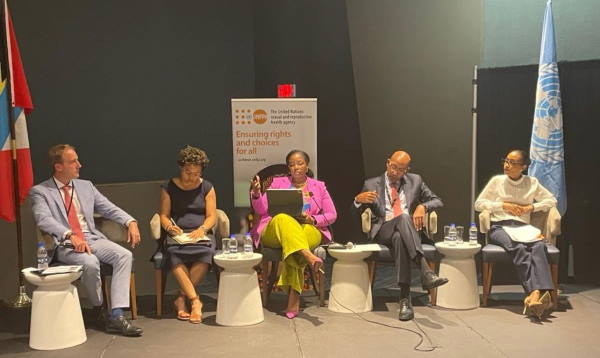 ANTIGUA AND BARBUDA:--- Minister of Justice Anna Richardson spoke at the Regional Conference on Population and Development in Latin American and the Caribbean. Organized by the United Nations Population Fund (UNFPA) in collaboration with the Government of Antigua and Barbuda and the United Nations Economic Commission for Latin America and the Caribbean (ECLAC), the Minister was invited to form part of the panel on the contribution of migrants to sustainable development reflecting on labor mobility, threats and opportunities related to skilled migration and diaspora engagement, and most relevant for the Caribbean, as we deal with regional political unrest and increasing threat of climate change, the management of migration in response to humanitarian emergencies. She was supported by the Director of the Department of Foreign Relations Mr. Patrice Gumbs Jr.
ANTIGUA AND BARBUDA:--- Minister of Justice Anna Richardson spoke at the Regional Conference on Population and Development in Latin American and the Caribbean. Organized by the United Nations Population Fund (UNFPA) in collaboration with the Government of Antigua and Barbuda and the United Nations Economic Commission for Latin America and the Caribbean (ECLAC), the Minister was invited to form part of the panel on the contribution of migrants to sustainable development reflecting on labor mobility, threats and opportunities related to skilled migration and diaspora engagement, and most relevant for the Caribbean, as we deal with regional political unrest and increasing threat of climate change, the management of migration in response to humanitarian emergencies. She was supported by the Director of the Department of Foreign Relations Mr. Patrice Gumbs Jr.
Minister Richardson began her intervention by offering the context of Sint Maarten, a tourism-dependent, non-independent developing small island. “Sint Maarten is an autonomous 16 square-mile country on a 37 square-mile island, with a small local population. Prior to hurricanes Irma and Maria in 2017 and the COVID-19 pandemic, cruise tourism brought some 2 million passengers to our shore annually, and stayover tourism just under half a million. This was matched by large industry-related sectors including construction. With a small population like ours, migrants play a pivotal role in Sint Maarten's labor force. Consequently, we have a majority foreign population, many on short-term contracts, representing over 100 different nationalities.
As Small Island Developing States, have levels of vulnerability, the impact of exogenous shocks, like hurricanes and the pandemic, on seasonal, single-pillar economies like Sint Maarten’s that are highly dependent on migrants, can be detrimental. The Minister stated that “the challenge for Caribbean countries is how do we create financial stability while charting a path towards sustainable development, especially in a sector known for its negative impact on the environment and so susceptible to major migratory shifts and flows. Moreover, how do we even begin to mobilize the necessary policy changes necessary in islands like ours with limited human capacity?”
Minister Richardson indicated that addressing the vulnerabilities faced by migrants, particularly those in irregular status, is imperative, and the COVID-19 pandemic, with the rise in unemployment and fall in revenue, not only exacerbated their vulnerability but made more acute our responsibility to ensure their well-being. In 2021, in collaboration with the Department of Foreign Affairs, the Minister of Justice extended an invitation to the International Organization for Migration (IOM) to execute a professional analysis of Sint Maarten’s migrant population. The comprehensive study has shed light on the complex dynamics of migration and its impact on our societies and economies.
One of the key recommendations of this report was the need for data. “This is one of the common threads throughout many of the reports about Sint Maarten in a myriad of subject matters and has been a factor in our developing sustainably. The challenge of unregulated migrants, in particular, who sit on the fringe of society, but form a large and vital part of the labor force in our tourism-based economy, makes policymaking to address the needs of our country challenging. Their exclusion and being left in the shadows skew the projected needs of a country’s needs in critical areas such as housing, health, and educational, creating a disenfranchised group and ultimately a fragmented people and discordant society”. Minister Richardson outlined the current policy practices in place as it relates to migrants and shared two initiatives that the Ministry is undertaking. The first is a pilot project that began in January 2023 which gives employers who have tenured non-national employees with an undocumented status the opportunity to regulate same. In principle based on the immigration policy one would have to be off-island as a first-time applicant amongst other things. However, this was one of the waivers that were put in place in order to give the employees a fair opportunity. This project was done in collaboration with the Ministry of VSA & TEATT. The second initiative takes a look at the immigration policy through the lens of human rights. “I have recently called for the removal of the marital requirement for the processing of residence documents. Often, it is women who fall victim to the violating condition of domestic abuse due to the need to remain married for the sake of regulating their status.”
The Minister said that we must remember to strike a balance between the needs of our tourism economy, which requires a young able-bodied labor force and the ageing population of our region, as well as to provide protection for our environment. “The reality is for countries like ours maintaining this balance requires an integrated government, moving away from our usual silo approach to policymaking and creating a robust inter-ministerial coordination unit to best address the needs of our constituents”.
In our pursuit of this, the Government is a strong advocate of the Sustainable Development Goals. In the recently launched National Development Vision, the Prime Minister of Sint Maarten underscored the SDGs as the guiding tenants of our policy initiatives moving forward, spearheaded by the Department for Kingdom and Interior Relations. Our national development vision includes reducing inequalities and maximizing employment opportunities for residents, while also strengthening diplomatic relations, through Sint Maarten’s Department of Foreign Affairs, with migrant-sending countries to better understand the context within which our policy measures must work.
The Minister recalled the value of SDG 17, Partnerships in her final remarks Small Island developing states, we cannot work in isolation of each other, and just as we dismantle our silo-style national organizations, we must work towards minimizing the political, social, and more importantly mental barriers that hinder our regional cooperation, especially on such a critical subject as migration.
The Minister closed by expressing her honor at having been invited to offer experiences and best practices on how to best facilitate migrant integration and the opportunities to creating a prosperous society for all.
The Conference and the subjects discussed, including demographic trends in the Caribbean adolescent pregnancy, and Gender-based violence, aimed to foster the accelerated implementation plan of the Montevideo Consensus on Population and Development in the Caribbean. Signed in Montevideo, Uruguay in 2014 by 38 member countries and associate members of the United Nations Economic Commission for Latin America and the Caribbean (ECLAC), the Consensus contains a series of agreements to strengthen the implementation of population and development issues.











